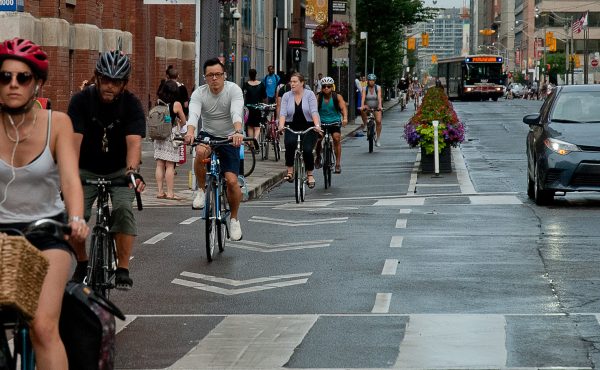
A couple of summers ago, I did a post about a bike being stolen from in front of the police HQ. I said that the police ought to make more effort about bike theft. The post got a lot of comments, and over the next two summers, it kept getting more comments from people whose bikes were stolen, looking for advice about what to do. And the advice was often the same – “Check Igor’s.” Igor Kenk’s infamous bike shop across from Trinity Bellwood Park seemed to be known to everyone as the place to go to find a just-stolen bike, and several people posted or told me anecdotes about recovering their stolen bike there.
I was helping with developing the Toronto Coalition for Active Transportation’s (TCAT) election platform that summer, and the discussion inspired us to include an item calling for a police strategy to seriously tackle bike theft. Given the fact that bike theft is a mostly local affair, with known outlets and traceable serial numbers, we felt that a little effort by the police could make a big difference.
It turns out, we were right.
A couple of weeks ago, a Toronto Sun reporter named Brett Clarkson got in touch with me because he was doing a story about bike theft and he was interested in TCAT’s idea. We talked about a lot of issues, including Igor (whom he had interviewed). We wondered, as I had sometimes wondered with others, why Igor was never brought to trial, despite his seemingly obvious role as a purchaser of stolen bikes. We wondered if perhaps it was because at least he was a known quantity, and both police and victims knew where to go if a bike was stolen.
Coincidentally (or perhaps the Sun had heard something), the police actually did start a anti-bike-theft program the next week. And the result was much more dramatic than anyone, including I suspect they, anticipated. First, undercover police watching an unrelated bait bike saw (allegedly — the trial is still to come) Igor specifically direct someone to steal a different bike, and then buy it from them. Catching him red-handed, they finally had no choice but to arrest and charge him.
But then came the really dramatic turn of events — police discovered he had several warehouses full of bikes around the city. Which means it wasn’t simply a case of go to Igor’s and you could find your stolen bike if he had it — he had caches where he could spirit bikes away. There are thousands of bikes there, and already it’s been shown that some of them are stolen (anyone who has had a bike stolen in recent years should check out the police collection).
This is a real opportunity, if the police and the cycling community seize it, to make a long-term dent in bike theft in Toronto. There will always be some bike theft, of course. But before Igor’s arrest it seems to have been easy for casual thieves to make a quick turnover on a stolen bike. Now that what was apparently an easy outlet is gone, they might not be able to unload a bike as quickly or safely, which means they might not bother picking off less valuable bikes. If police keep up the pressure, and if cyclists systematically register their bikes, it might be possible to make bike theft and bike fencing complicated, inconvenient, and risky, so that only the hard-core thieves will put in the effort — which would reduce the number of bikes stolen every year.
One thing that would help would be for all bike shops to be able to do automatic bike registration with police when a bike is purchased. I’m sure it would be possible if the shops and the police got together and worked out a system. There might also be ways to get shops that buy and sell second-hand bikes to track and check serial numbers more rigorously, perhaps as part of an enhanced registration system. The city could maybe even create a specific licence for shops to buy and sell used bikes, which could be withdrawn if they are found to be lax about stolen bikes. There are various possibilities, but I think there must be some way to tighten up the trade in used bikes to make it more difficult to unload a stolen one.
The other interesting aspect of this story is the new interest in bike issues of the Sun and the police, who haven’t previously paid them much attention. It coincides with, for example, the Globe and Mail doing a spread on cycling fashion. It would be easy to scorn this interest, but I find it very encouraging. I wonder if cycling has reached a “tipping point” at which it is suddenly becoming a mainstream way to get around town — the result perhaps of a combination of high gas prices and a newly energized and organized cycling community. It might take some adaptation from a bike community used to a certain outsider status, but the benefits in terms of general awareness and safety, not to mention a cleaner and healthier city, are well worth it. (There’s a thoughtful post on ibiketo.ca about new cyclists).
photo by Sam Javanrouh




17 comments
I have a couple questions about this whole thing.
All the rumors about him notwithstanding, how can the police conclude, legally, that all 2000 bikes he has are stolen on the basis of seeing him steal 2 bikes?
What was he planning on doing with all those bikes? It seems like more then he could possibly use, even for parts. I’m sure it wasn’t that cheap to pay rent for all those storage locations.
Here’s a question: How can a purchaser verify that their bike isn’t a stolen one? We used Craig’s List to buy everything from a garden shed to furniture. And we’ve found some great bikes. Of course you try to avoid the sketchy listings (i.e. “…freshly painted”) and for the most part, we’ve met other cyclists who are either upgrading, or changing sports, getting serious about their recumbent, or are finally getting rid of their beautiful steel frames for carbon.
But if I’m buying a bike second-hand, from (presumably) the original buyer who may not have the original receipt, how do I look up the serial number to be sure my purchase is legit and it’s not already listed as a stolen bike? Of if I sell my bike, how to I go about changing the registration information to the new owner?
With Craig’s List, eBay, and other on line auction sites and classifieds being so prevalent, this issue needs to be addressed.
Darwin > you’re right, the CBC headline, for example, is misleading. However, it’s already been shown that at least dozens the bikes are stolen, because the owners have recovered them (I was careful to phrase it that way). I expect not all of them are stolen, some of them are probably legitimately second-hand.
I, too, am wondering about the mass of bikes, some kept for a long time. It seems odd.
I never wrote down my bike serial number, how do I get mine back? Oh well.
I am showing my age, but at one time many municipalities licensed bikes; it was a big deal. You got a bike and had to get a little plastic panel with a metal band that locked it onto the back forks just under the seat. Your name and the bike’s serial number were linked in a police database. If you sold a bike, you had to transfer the license and buy a new one for the new bike. I’m sure cities stopped doing this because it cost more than it made, and police felt that such administrivia was beneath them, but as an anti-theft device it had something to recommend it. We license dogs, taxis, hot dog carts and even spots for entertainers on subway platforms. So it’s not a stretch to license bicycles. A minor inconvenience, maybe, but it seems to beat the rather flaccid, voluntary registration system that now pertains.
A charming sociopath, very common.
First kudos to the Sun journalist who shone the spotlight on Igor and to Dylan for aiding the discussion.
As more garages full of bikes are found I have a couple of observations.
I don’t think it was about bike theft. As a business model – paying someone $50 or even $25 for a stolen bike and then storing it , not selling it makes no sense. In fact I’m guessing purely as a bike theft business Igor was losing money on this side of things.
On the other hand as a loss leader for another business it could be quite profitable. I’m beginning to wonder whether the bikes were a way for him to connect with a particular subset of society that purchased drugs while trading on stolen bikes.
This is important because it connects the bike theft trade with the drug trade which then connects with any number of other challenging, very real an d very serious police issues (gangs, guns, etc.)
While the police may consider bike crime to be petty property theft, what Igor and his garages full of bikes seem to be telling us is that bike theft is connected to bigger more serious problems that in fact DO REQUIRE POLICING.
I’m hoping that it’s not just me making this connection but that whoever develops police policy takes note. Bike advocates and organizations like the Bike Union should also take note of this gift from Igor and use it to compel the police to treat it as the crime ecoystem element it is.
That Igor didn’t just toss his loss leader bikes into the garbage or Lake Ontario tells me that he’s cheap and he likely has a hoarding problem as well. But his business model tells me that we’ve got a much more serious issue on our hands and that Toronto’s police need to treat bike crime like they treat the drug trade because they may one and the same.
Why would anyone conclude that a couple of arrests will lead to a reduction in bike theft? One of two things will now happen:
1. The defendants will plead guilty before trial and avoid any jail time at all under the province’s diversion program. They’ll then be free to resume their business. Or,
2. The defendants will go to trial. Chances are the female defendant will get off completely free for testifying against her husband by playing the Homolka get-out-of-jail free card, but that’s another story. Whoever is found guilty will then receive little, if any, jail time, and that will be further significantly reduced by statutory parole.
Either way, they’ll be back on the streets within 2 years from today, secure in the knowledge that there is no meaningful punishment for property crime in Canada. In their absence other crooks will fill in for them.
The bottom line is that this problem can’t be solved by the police alone – the courts and legislatures have to create sufficient disincentives for people like Igor to conclude major, systematic theft isn’t worth the risk. In other words, harsher penalties with higher probabilities of being realized quickly. Unless you want to believe that a really caring basketball program is all we need to turn Igor around.
I think ‘Dabusan’ is on the money about the drug loss-leader and hoarding issue. I said the same thing on another blog. However, don’t expect too much from the ‘justuce’ system.
I have a four-part system for bike theft:
1. Register in Toronto: http://www.torontopolice.on.ca/bike/
2. Register Nationaly (use ‘MEC’ as the promo code for 50% discount): http://www.bikeregistrycanada.com/registerbike.html
3. Try to keep your bike inside, or with you, at all times
4. When you must lock it, U-lock through the front wheel and frame; cable through the seat, back wheel and frame; both locks through something immovable
Good luck.
5. Take a photo of all your bikes
What’s “bike fencing”?
“Fencing” refers to the re-sale of stolen goods.
I used to live on Strachan Ave, one block from Igor’s store. Six bikes were stolen from outside my house within a few years. Before the bike posts were installed (on my request) I used to lock my bike to a stop sign. The thieves would remove the stop sign, which caused several accidents, many of them serious.
I complained to the police several times (about the stop sign being removed and the bike thefts). I explained that someone will eventually be killed if something isn’t done about the situation.
The city eventually installed a blinking red light at Adelaide and Strachan, but nothing was done about Igor. The cops actually told me several times to “check up at Igor’s” after reporting the thefts.
What surprises me is the police, who have a station located just south of Igor’s store, didn’t investigate Igor’s activities. If his activities involved drugs, wouldn’t have that made prosecution even easier?
One wonders if the police actually have the ability to prevent crime, or if they just take reports after the fact.
It did involve drugs, in the end. Maybe that’s why it happened. Maybe it’s because Millar didn’t like the way it made the city look, printed in the newspapers. The reasons had nothing to do with justice for cyclists, you can be sure.
Wow. Toronto police should be ashamed of themselves for allowing the Igor situation to get as bad as it did. Cyclists get no respect in this city.
Bike fencing: not to be confused with bike jousting.
this isn’t about bikes, it is about real estate. ten years ago the cops told me to “go to igors” when a bike was stolen from a project I was working on. Then, queen street was grotty; now it isn’t and igor didn’t fit.
It is always about real estate.